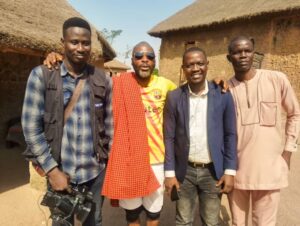Africhata Film Village: How Ibrahim Chatta’s Vision is Transforming a Quiet Village into Nigeria’s Cinematic Powerhouse
By Ola Awakan
From script to screen, filmmaking can often feel like an uphill battle—juggling logistics, securing ideal locations, and managing cast and crew. But film villages are reshaping the terrain, offering all-in-one spaces that simplify the creative process while breathing life into rural communities. One such wonder lies deep in the heart of Oyo Town: Africhatta Film Village and Resorts.
 A product of actor and filmmaker Ibrahim Chatta’s vision, Africhatta is not only revolutionizing Nigerian cinema but also transforming the lives of the people in Balogun Village, where the film village is located.
A product of actor and filmmaker Ibrahim Chatta’s vision, Africhatta is not only revolutionizing Nigerian cinema but also transforming the lives of the people in Balogun Village, where the film village is located.
A Cinematic Oasis in the Heart of Oyo
Set on a vast 74-acre stretch of land, Africhatta is a blend of old-world charm and modern luxury. Traditional mud houses sit next to well-furnished lodgings, horses roam alongside palm trees, and grand sculptures speak of ancestral legacies. It’s a place where stories are not just told—they’re lived.
“We wanted a place that preserves culture and also welcomes modern film needs,” said Majekodunmi Samson, manager of the village, during a guided tour.
Since its inception, Africhata has hosted major productions such as Lisabi, Iyalode, and Labake Olododo. Its facilities include market scenes, ancient compounds, a growing number of pools, and even a budding art gallery with investments reportedly exceeding ₦1.4 billion.
From Dreams to Reality: The Man Behind the Vision
Born to a Tapa father and a Kwara mother, Ibrahim Chatta’s journey into film began under the legendary Hubert Ogunde. But it wasn’t all rosy.
“I worked as a bus conductor for over eight years. I hawked ice cream and popcorn. I didn’t go to school—I just knew I had to be better,” Chatta shared, reflecting on the hardship he endured before reaching this point.
His passion for telling traditional stories drove him to build a space tailored for African narratives. “People renovate their ancestral homes, and we lose shooting locations. So I thought—why not build one from scratch?”
Interestingly, Balogun wasn’t the original plan. But fate intervened, and the once-sleepy village is now on the map.

Horses, Art, and Ambition
Chatta is also an equestrian enthusiast, keeping 21 horses, four donkeys, and a camel. At one point, he had over 60 horses, making him second only to the Emir of Gombe in terms of equine ownership in Nigeria.
He personally drew up the architectural masterplan for the village, including its pools and buildings. “I’ve done everything myself,” he said. “But maintaining this place is very expensive. Every day I go broke.”
Yet, he remains hopeful. “I pray I get help. There’s more coming—more pools, more sets, more stories.”
A Blessing for Balogun Village
For the people of Balogun, Africhatta has been life-changing.
“Commercial activities have improved, and youths are engaged,” said Samuel Olajide, son of the village’s first head. His father once prophesied a stranger would transform their village—and many now believe Chatta is that man.
Titilayo Ojedele, a food vendor, attested to how employment at the film village uplifted her life. “We cook for at least 50 people daily. It changed my life.”
Village head Oladejo Ologunde confirmed that local artisans are being hired for construction and services. “This has helped our community more than we ever imagined.”
Government Recognition and Support
The film village has also caught the attention of Oyo State’s Ministry of Information and Tourism. Commissioner Dr. Wasiu Olatunbosun praised the initiative, comparing Africhatta’s scope to global standards.
He noted Chatta’s concern about the only primary school in the village, where students face long commutes to Oyo town. In response, the state government pledged to send teachers and improve infrastructure.
Cultural Magnet and Tourist Hotspot
On a second visit to Africhatta, the impact was even clearer. More structures had sprung up, and tourists from Kano, Abuja, and beyond were exploring its rustic beauty.
“Africhatta brings education and entertainment to life. It’s an institution,” said visitor Adekunle Adeoye. Others echoed similar sentiments about its role in preserving Yoruba heritage.
A major attraction is horse riding, managed by Mohamed Dahiru, who admitted he never planned to stay long. “But the passion and vision here… it’s rare,” he said.
Looking Ahead
Even amid his accomplishments, Chatta remains grounded and focused. “I just want to be a better person. I think about death every day. Before, I couldn’t feed myself—now I feed others.”
He has also launched the Light Up Balogun Project and is pushing to restore the community’s dilapidated school.
Africhatta is no longer just a film village; it is a beacon of culture, resilience, and artistic excellence—proof that one man’s vision can reshape an entire community.





